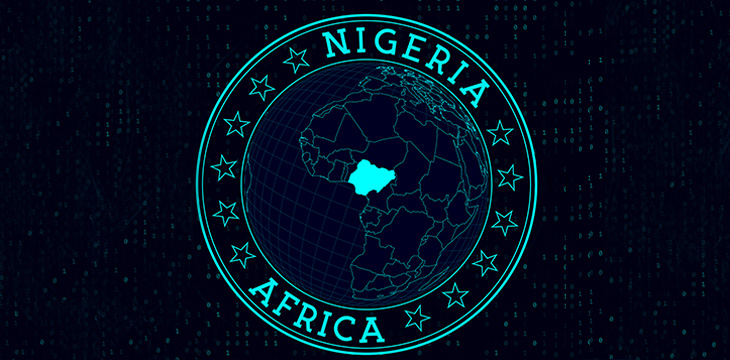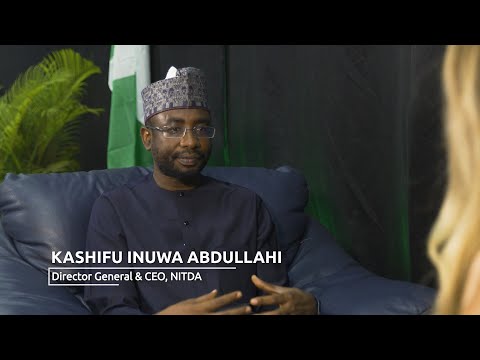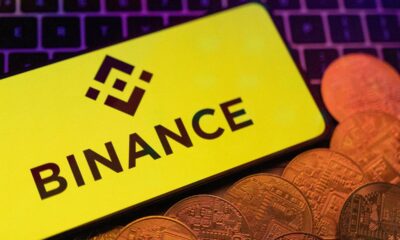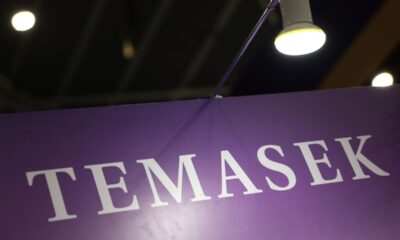News
Forbes Blockchain 50 2023

Despite 2022’s crypto market collapse, dozens of enterprises around the world are still investing in blockchain, the distributed-database technology that underpins the entire sector because it helps their businesses operate better, faster or cheaper.
Edited by Nina Bambysheva and Michael del Castillo
Reported by Nina Bambysheva, Michael del Castillo, Steven Ehrlich, Chris Helman, Jeff Kauflin, Maria Gracia Santillana Linares, Emily Mason, Rosemarie Miller, Javier Paz, Jon Ponciano, David Westenhaver
Illustration by Lena Weber for Forbes
Crypto is in the toilet. Even after a January rally that saw prices jump by a third or more, the cryptocurrency market is still down 38% over the last 12 months, wiping out some $630 billion of wealth. Faddish bits of the market, like NFT digital collectibles, have done even worse. Prominent prophets like Sam Bankman-Fried have been exposed as incompetent at best, criminal at worst. Despite it all, dozens of enterprises around the world are still quietly investing in blockchain, the distributed-database technology that underpins the entire sector. These mostly big, mostly smart firms aren’t throwing good money after bad. They’re doing it because blockchain helps their businesses operate better, faster or cheaper.
AI50
Alphabet
Mountain View, California
Through its venture capital arms, Alphabet has invested in blockchain firms like Fireblocks, Dapper Labs and Digital Currency Group. In addition, Google’s Cloud division last January formed a specialized team devoted to helping companies access crypto market data more quickly and launch blockchain-based products. Via Coinbase, Google will soon start accepting cryptocurrency as payment for cloud services.
Key Leaders: Amit Zavery, Google Cloud; Sunita Verma, Labs at Google
Ant Group
Hangzhou, China
Alibaba’s giant fintech affiliate has a proprietary blockchain running more than 50 apps. One of them, called the Treasure Project, helps museums and galleries popularize their collections by creating and distributing copies of ancient Chinese artifacts in the form of digital collectibles that are similar to NFTs. Ant has also developed an engine that it says is 15 times more efficient at storing blockchain data than mainstream providers. Topnod, a digital collectibles platform powered by Ant, is already using it and saves 75% on storage costs.
Key Leaders: Geoff Jiang, Intelligent Technology Business Group
Aon
London
Many organizations test job candidates. In June, the global professional services firm launched a blockchain service that enables job seekers to store and share the results of their assessments (say, an IQ test or a coding exercise) with multiple employers, eliminating the need to take the test more than once. Aon will apply the service to the 30 million assessments it administers annually.
Key Leaders: Greg Case, CEO; Christa Davies, CFO
Apollo
New York
In April, the $500 billion (assets under management) private equity manager hired JPMorgan’s cryptocurrency guru, Christine Moy, who wants to use blockchain to improve visibility into alternative investments like mortgages. In March the firm bought its first mortgage tracked on a blockchain, reducing the weeks-long settlement time to seconds.
Key Leader: Christine Moy, head of digital assets
Christine Moy, head of digital assets at Apollo
Courtesy Christine Moy
“Crypto encompasses many things. We’re focused on the technologies that can be applied and can scale, whether that’s capital raising, securitization, even trading. It’s rooted in real-world use cases that will make our business faster, more efficient, more accessible.”
—Christine Moy
Baidu
Beijing
Baidu’s new blockchain platform XuperAsset helps more than 400 companies issue digital collectibles—essentially Chinese NFTs, but because crypto trading is illegal in China, these nonfungible assets go by a different name there and resale is prohibited. Nearly 1 million copyrighted goods, mostly artwork and videos, have been created, generating around $35 million in fees for Baidu in the last 12 months. Outside of these non-NFT NFTs, more than 30,000 blockchain developers worldwide use Baidu’s open-source code.
Key Leader: Xiao Wei, Baidu Blockchain
BlackRock
New York
Last summer, BlackRock began offering direct investment in bitcoin for clients. It is also the primary manager of stablecoin USDC reserves (see story) .
Key Leaders: Robert Mitchnick, Digital Assets; Adam Salvatori, Digital Assets Lab
Block
San Francisco
In addition to giving away its code to bitcoin developers, Block is working with Coinbase and Circle to build a way to prove one’s identity without middlemen. Think using Facebook’s login for other websites without handing Mark Zuckerberg your private information. It’s part of Jack Dorsey’s big vision to create an open-source “financial substrate” that could lie at the foundation of Square and Cash App (it generated $1.8 billion in bitcoin revenue in Q3).
Key Leader: Jack Dorsey, CEO
Jack Dorsey, CEO of Block
Marco Bello/AFP/Getty Images
“The internet requires a currency native to itself. And in looking at the entire ecosystem of technologies to fill this role, it’s clear that bitcoin is currently the only candidate. It has proven resilience over a decade.”
—Jack Dorsey
BNY Mellon
New York
In addition to providing custody services for crypto assets (see story), it’s also working with the New York Fed on a digital dollar pilot project.
Key Leaders: Roman Regelman, Securities Services and Digital; Caroline Butler, CEO of Digital Assets; Michael Demissie, Head of Innovation and Advanced Solutions
Broadridge
Lake Success, New York
The financial technology company is modernizing the repurchase agreement (repo) market by automating the life cycle of these contracts. Instead of manually booking transfers of collateral across each institution’s systems, asset managers, banks and hedge funds can now transact with one another using a shared ledger. Launched in June 2020, Broadridge’s blockchain platform is now averaging $50 billion in daily trading volume for users like Société Générale.
Key Leaders: Germán Soto Sanchez, Corporate Strategy; Prakash Neelakantan, Blockchain Strategy
Chainalysis
New York
At least $3 billion worth of crypto was stolen last year, and Chainalysis specializes in finding it. The 700-person firm scours blockchain transactions and smart contract data for the electronic footprints of hackers and scammers. More than 1,000 firms including Robinhood, Bitfinex and BNY Mellon, plus a slew of three-letter agencies such as the SEC, DEA and FBI, are customers
Key Leaders: Michael Gronager, CEO; Jacob Illum, chief scientist
Coinbase
San Francisco
Coinbase had a dismal 2022, losing 85% of its market value. Still, it remains the U.S.’s largest crypto exchange, holding $101 billion in assets for more than 100 million clients worldwide.
Key Leader: Brian Armstrong, CEO
China Construction Bank
Beijing
The world’s second-largest bank by assets is using blockchain to connect lenders with investors (see story).
Key Leader: Hao Tan, CCB Fintech
CME Group
Chicago
The old-school futures trading exchange trades lots of crypto derivatives in a highly regulated environment. This reliability gives it a leg up over sloppy and bug-prone exchanges and Web3 projects (see story).
Key Leader: Tim McCourt, Equity Index and FX Products
De Beers
London
De Beers, which sources diamonds in Canada, Botswana, Namibia and South Africa, has been using blockchain since 2019 to track the gems as they’re mined, cut, polished and sold, and is now processing more than 100,000 stones a month. Overall, its Tracr blockchain keeps tabs on 600,000 registered diamonds, roughly 15% of the world’s production—a haul of precious stones worth more than $2 billion.
Key Leader: Wesley Tucker, Digital Transformation
Estée Lauder Companies
New York
People care about what they put on their skin, so cosmetics behemoth Estée Lauder Companies is blending blockchain technology with its brands like Aveda to track components such as vanilla extract and pomegranate seed oil, whose supply chains are vulnerable to environmental and labor issues.
Key Leader: Christine Hall, Aveda R&D
ExxonMobil
Irving, Texas
When Exxon contemplates drilling a new oil well with a partner or expanding a joint-venture pipeline, it’s put up for a vote. For the past 100 years this process has involved distributing round after round of paper ballots. Exxon’s pilot project with GuildOne uses Corda blockchain to speed the process, eliminate disputes and save on mailings. Another pilot with the Blockchain for Energy consortium aims to simplify the often complex process of royalty payments to landowners.
Key Leaders: Raj Rapaka, Digital Transformation; Adam Brown, intellectual property counsel
Fidelity
Boston
In November, just as the demise of crypto exchange FTX was panicking investors, solid-as-a-rock mutual fund giant Fidelity, already a digital asset custodian for institutions, announced it would soon let its 36 million retail customers buy and sell bitcoin and ether, commission-free.
Key Leaders: Abigail Johnson, CEO; Tom Jessop, Digital Assets
FIS
Jacksonville, Florida
This large Florida payment processor has been handling debit card transactions for Coinbase customers since 2017. FIS also works with Binance and Kraken, and in 2021 it facilitated $30 billion worth of card-to-crypto transactions (merchants are paid in U.S. dollars out of customers’ crypto balance). In April 2022, it partnered with Circle to let merchants settle with each other using stablecoin USDC, which is pegged one-to-one to the U.S. dollar.
Key Leader: Himal Makwana, Product Strategy and Web3
Franklin Templeton
San Mateo, California
Building on its $100 million Franklin OnChain U.S. Government Money Fund, which is tracked on a blockchain, in April 2022 the $1.4 trillion (assets) asset manager invested an undisclosed sum in Eaglebrook Advisors, a Miami-based startup that creates crypto portfolios (both actively and passively managed) for investment advisors and institutions.
Key Leader: Roger Bayston, Digital Assets
Fujitsu
Tokyo
The electronics powerhouse runs a blockchain innovation lab in Brussels for more than 50 clients including Italian carmaker Iveco and beer giant Anheuser-Busch. In July, it partnered with Tokyo chemical conglomerate Teijin to create a blockchain for manufacturers looking to offset their carbon footprint by using recycled materials. The software verifies the origin of recycled materials and then tracks a firm’s carbon footprint over time—making it difficult to falsify or greenwash data.
Key Leaders: Frederik De Breuck, Enterprise Blockchain Solution Center; Shingo Fujimoto, Fujitsu Research
Genentech
San Francisco
Since 2018, Genentech has been working with blockchain builder Chronicled on MediLedger, a distributed ledger that helps pharma fight counterfeit medicines and increase the speed of drug delivery to patients by enabling manufacturers, distributors and group purchasing organizations quickly process large amounts of product-related data. MediLedger is also being used by companies such as Pfizer, Johnson & Johnson and AstraZeneca.
Key Leader: David Vershure, vice president, channel and contract management
Goldman Sachs
New York
Blockchain is helping the Wall Street titan dramatically speed bond underwriting (see story).
Key Leader: Mathew McDermott, Digital Assets
HSBC
London
The British bank is using blockchain to increase the efficiency of foreign-exchange flows among its global branches. Since 2019, its FX Everywhere platform, which now also includes Wells Fargo, has settled trades with a nominal value of more than $4.6 trillion. Blockchain technology is also enabling HSBC to reduce bond settlement time from about four days to one.
Key Leader: Mark Williamson, FX Trading and Risk Management
Industrial and Commercial Bank of China
Beijing
The $5 trillion (assets) bank has more than 100 blockchain products either rolled out or in development, but its work on Chinese digital currency—RMB smart contracts—stands out for the way in which it helps protect customers’ funds for digital transactions. For example, a villager in Chengdu received his payment in digital RMB through a smart contract that ensured it came through as soon as he had finished planting his quota of trees.
Key Leader: Chaowei Liu, principal manager
JPMorgan
New York
Last Halloween, Onyx, its business unit that focuses on cutting-edge technologies, ran its first decentralized finance transaction on a public blockchain, using Ethereum to exchange Japanese yen for Singaporean dollars. Settlement time dropped from two days to mere seconds, and the tech enabled participants to prove their identities without needing to reveal them on the public blockchain. Additionally, JPMorgan has used blockchain to execute repurchase agreements (see story) and has transferred $25 billion using the JPM Coin network.
Key Leader: Umar Farooq, CEO of Onyx by JPMorgan
Umar Farooq, CEO of Onyx by JPMorgan
JPMORGAN
“We believe blockchain has the potential to rewire the core infrastructure of financial services.”
—Umar Farooq
Kakao
Jeju, South Korea
Despite a roughly 50% drop in NFT sales for the last six months of 2022 versus the previous year, Kakao’s NFT marketplace has 2 million registered users and is available to anyone who uses Kakao Talk, which is about 90% of South Korea’s 52 million people. Around 60 games are in development on Klaytn, Kakao’s blockchain.
Key Leader: Sangmin Seo, Klaytn Foundation
KKR
New York
In September the storied private equity firm partnered with digital asset securities company Securitize to open one of its funds for sale on the Avalanche blockchain, reducing costs to outside investors (see story).
Key Leader: Dan Parant, U.S. Private Wealth
Line
Tokyo
Japan’s leading messenger app helps create NFTs for 26 big customers including SoftBank, South Korea’s Naver search engine and Visa on a new global NFT platform called Dosi. Despite the NFT bust, more than 100,000 people have registered on Dosi as of November 2022 to collect things like images of K-pop stars since September.
Key Leaders: Youngsu Ko, Line Next; Inkyu Lim, Line Xenesis; Woosuk Kim, Line Tech Plus and Line Next
Mastercard
Purchase, New York
The payments company is all in when it comes to Web3. In 2021 it acquired crypto security firm CipherTrace, which fights fraud by identifying risky cryptocurrency transactions. In 2022, 35 crypto companies, including Binance and Nexo, issued debit cards emblazoned with the Mastercard logo (see story).
Key Leader: Raj Dhamodharan, head of crypto and blockchain
Raj Dhamodharan, global head of crypto and blockchain at Mastercard
Mastercard
“We enable people to spend crypto using their Mastercards and help banks understand crypto transactions through our blockchain analytics. When consumers want to cash out to a bank account, our Mastercard Send network enables this. The trust of our network is paramount.”
—Raj Dhamodharan
McCormick & Company
Hunt Valley, Maryland
The spice and seasoning giant is using QR codes connected to a blockchain to ensure that the vanilla it sources from Madagascar is free of any connection to deforestation. So far, the project is limited to France and Switzerland, but the blockchain-traced vanilla still ends up in more than 3,400 stores.
Key Leaders: Clare Menezes, Global Food Integrity & Risk Management; Iwona German, Western Europe marketing director
Meta
Menlo Park, California
Since its October 2021 rebranding, Meta has spent billions on its Reality Labs division attempting to give the “metaverse” a pulse. By CEO Mark Zuckerberg’s own estimation, losses will continue for years. In the here and now, Meta is giving users the tools to create and share (but not buy and sell) their own NFTs across Facebook and Instagram.
Key Leaders: Mark Zuckerberg, CEO; Andrew Bosworth, CTO
National Basketball Association
New York
The league’s Top Shot platform, a digital collectible marketplace, was one of the great early NFT success stories, banking $1 billion–plus in sales since it launched in 2020. Outside of Top Shot, which has seen its trading volume crater to just $3 million in January, the NBA is working to increase fan engagement by handing out free NFTs to all 9,000 fans attending a July WNBA game in Chicago. It also hosts a free NFT fantasy basketball league created by French startup Sorare.
Key Leaders: Adrienne O’Keeffe, Global Partnerships and Media; Amy Brooks, chief innovation officer
Adrienne O’Keeffe, head of digital consumer products at the NBA
National Basketball Association
“The future of basketball and the NBA will be defined by digital innovation and our ability to reach fans on their preferred device and language. We are truly just scratching the surface with regard to what we can accomplish in the Web3 space.”
—Adrienne O’Keeffe
Nike
Beaverton, Oregon
In December 2021, Nike acquired RTKFT, the virtual clothing startup that helped launch Cryptokicks. Collectors can now own both physical and digital versions and wear them in Nikeland in the Roblox metaverse. The sneaker giant’s Cryptokicks “forges” NFTs to its shoes by fitting each pair with a tiny chip linked to a blockchain. Next up: Swoosh, which will let customers design—and trade—their own digital kicks.
Key Leaders: Steven Vasilev, Benoit Pagotto and Chris Le, RTFKT cofounders
Steven Vasilev, cofounder of RTFKT
NIKE
“The future will be built by internet/technology native kids. We aim to empower the next generation of creators and democratize access through creation. In the future people will care more about their virtual items than their physical items.”
—Steven Vasilev
NTT
Tokyo
The data and IT consulting subsidiary of Nippon Telephone & Telegraph, NTT Data, helped create an interbank reconciliation tool for Italian lenders called Spunta Banca. Built on the Corda distributed ledger platform and coordinated by ABI Lab, the research and innovation centre of the Italian Banking Association, it has handled 623 million transactions for roughly 100 Italian banks since March 2020, performing real-time checkups to ensure there are no mismatches in bank transfers.
Key Leader: Shinichi Yamashita, Blockchain Strategy
Oracle
Austin, Texas
India’s Delhi University awarded digital degrees to 170,000 students in 2022 and distributed the diplomas on a blockchain to ensure authenticity. Keep Sea Blue, a nonprofit based in Athens, Greece, helps partners verify removed and recycled plastic waste from the Mediterranean via a blockchain. Global Shipping Business Network, a consortium whose members handle one in every three shipping containers in the world, increases the efficiency and visibility of shipments. All used Oracle’s OCI Blockchain Platform.
Key Leader: Wei Hu, High Availability Technologies
PayPal
San Jose, California
The payment giant, which started offering access to crypto in October 2020, charges as little as 49 cents for smaller transactions. Crypto users, according to the company, visit PayPal twice as frequently as other users. It invested in Aptos Labs, parent of fast blockchain Aptos, created by Facebook veterans, last spring.
Key Leader: Dan Schulman, CEO
Repsol
Madrid
Spain’s oil giant is building a platform called VEIA Digitalis, which enables users to store things like driver’s licenses, security badges and passports in a blockchain-based “self-sovereign” wallet. The point is to allow people—mostly Europeans who live in government-intensive societies—to control which parts of their identity they want to share, and with whom. The project began in 2019 through Repsol’s work with the global blockchain consortium Alastria.
Key Leader: Nuria Avalos, digital consortium director
Robinhood
San Francisco
The zero-commission broker offers crypto trading to 23 million accounts, and as of last September, the company was a custodian for $9.4 billion worth of crypto. Robinhood Wallet is its proprietary Web3-friendly self-custody wallet for users who want to have full control of their assets, which more do in the wake of the FTX bankruptcy. More FTX fun: Some 7% of Robinhood stock tied to Sam Bankman-Fried was seized by the Department of Justice in January.
Key Leaders: Vlad Tenev, CEO; Johann Kerbrat, GM of Robinhood Crypto
Samsung Group
Seoul
It’s best known for smartphones and flat screens, but Samsung is also a leader in developing blockchain products and services. For example, AIA, the largest insurance company in the Asia-Pacific region, uses Samsung SDS’s blockchain Nexledger to quickly access clients’ personal information and process consent forms including insurance agents’ electronic signatures, reducing related costs by more than half. More than 150,000 Samsung employees use the in-house blockchain service to store things like product design documents and salary contracts; one big benefit is that they can’t be easily altered or deleted.
Key Leader: Yoensoo Kim, Blockchain Development Team Leader
Signature Bank
New York
Signet, Signature Bank’s Ethereum-based payments network for commercial customers, instantaneously processed $464 billion worth of digital transactions last year. One-fifth of Signet’s 2022 volume came from the logistics industry. Due to market volatility, the bank capped its crypto deposits at 20% of its total assets under management.
Key Leader: Frank Santora, chief payments officer
Société Générale
Paris
The financial giant is helping other institutions use public blockchains to record information about who owns registered bonds. In October it became the first bank in France to receive permission to handle assets issued on a blockchain.
Key Leader: Jonathan Benichou, CFO, SG Forge
Sotheby’s
New York
The NFT market is in a depression, but Sotheby’s still has a dedicated team of 20 focused on digital collectibles. It will soon launch a curated secondary market built on Ethereum and Polygon in which a rotating list of ten handpicked artists will sell their NFTs, with Sotheby’s taking a cut.
Key Leaders: Stefan Pepe, CTO; Sebastian Fahey, Sotheby’s Metaverse
Tech Mahindra
Pune, India
This IT conglomerate has partnered with ten major Indian telecoms—which collectively provide service to 1 billion customers—to use blockchain to fight spam calls and unwanted texts. If one telecom operator receives a complaint, all operators are alerted—and thanks to the magic of blockchain they don’t need to share sensitive customer info.
Key Leader: Rajesh Dhuddu, Blockchain and Metaverse
Rajesh Dhuddu, SVP and global business head, blockchain and metaverse at Tech Mahindra
Tech Mahindra
“We continue to work hard to further empower individual users to not only safeguard their individual data but also have complete control over who accesses it and how it gets democratized and monetized.”
—Rajesh Dhuddu
Tencent
Shenzhen, China
The owner of China’s ubiquitous social platform WeChat is using blockchain tech to help Chinese companies cut costs and speed up business. Using Tencent’s software, thousands of Chinese companies have been able to move their products through customs up to 50% faster. Additionally, about 400 million users in nearly a dozen Chinese cities use Tencent’s blockchain to pay taxes, settle medical bills and even process donations.
Key Leader: Powell Li, Tencent Cloud Blockchain
Ticketmaster
Los Angeles
Through its NFL partnership, Ticketmaster is giving football fans who attend games commemorative NFTs—a blockchain option for avid ticket collectors.
Key Leader: Brendan Lynch, Enterprise and Revenue
Visa
San Francisco
Like Mastercard, Visa allows users to pay with their crypto holdings. Some of the cards even offer cash-back or, bitcoin-back deals. It rolled out 10 cards last year, including one for now-bankrupt FTX. Five were from entities outside the U.S., including Ripio and Lemon Cash in Argentina.
Key Leader: Cuy Sheffield, VP Crypto
Walmart
Bentonville, Arkansas
America’s superstore—and largest grocer—uses blockchain to track the farm-to-store journey of 1,500 food products from 70 suppliers, which makes it easier to spot cases of contamination or spoilage. Walmart is also experimenting with blockchain-based invoices, which quicken the process from some three months to near real time.
Key Leaders: Archana Sristy, Blockchain Platforms; Tejas Bhatt, Global Food Safety Innovation
Archana Sristy, senior director II, blockchain platforms, Walmart Global Tech
Walmart
“Customer trust and safety are paramount; that’s why we’re committed to developing industry-leading blockchain platforms that allow us to quickly identify potentially contaminated products at any point of their journey across our entire supply chain ecosystem.”
—Archana Sristy
Warner Music Group
New York
The label behind Lizzo and Chris Stapleton is working with blockchain game developer Splinterlands (1.8 million users) to create arcade-style games that reward players with in-game items and a cryptocurrency called dark energy crystals, which has a market value of some $700 million.
Key Leader: Oana Ruxandra, chief digital officer
WeBank
Shenzhen, China
To process loans, banks typically require customers to produce reams of documents including titles and credit reports. It’s an area of friction in finance. WeBank’s new information verification platform, launched in April and used by roughly 2.5 million people, connects the notary office and borrowers via a single blockchain-based network to speed up and improve the application process. Approval rates for online auto loans requested by car buyers, for one, have gone from 20% to 80%.
Key Leader: Henry Ma, CIO
Wipro
Bengaluru, India
The Indian technology and consulting firm has created a blockchain platform that combats data tampering to help prevent identity fraud. Since September, some 1.6 million people have used it to share information with banks, colleges and other organizations.
Key Leader: Varun Dube, Blockchain
MORE FROM FORBES
ForbesHow Mastercard, Goldman Sachs And Other “TradFi” Titans Are Using Blockchain To Rewire Global FinanceBy ForbesOver $3 Billion Stolen In Crypto Heists: Here Are The Eight BiggestBy ForbesInside Tether, Crypto’s (So Far) Unbreakable BuckBy ForbesFallen Unicorns: Startup Billionaires Nearly $100 Billion Poorer Than A Year AgoBy ForbesA Quick Remedy Proves Elusive For Lifesaving Pulse Oximeter’s Problems With Darker SkinBy ForbesThe Only Thing Better Than An Elite Quarterback Is An Inexpensive Elite QuarterbackBy
News
Blockchain Technology Will Transform Water Access and Management Globally

Disclosure: The views and opinions expressed here are solely those of the author and do not represent the views and opinions of the crypto.news editorial team.
Access to clean water is a basic human need, yet billions of people around the world still struggle to get it. According to the World Health Organization, over 2 billion people live in countries suffering from severe water stress, and this number is expected to continue to grow due to climate change and population growth.
Traditional water management systems have struggled to address these challenges, often hampered by inefficiencies, lack of transparency, and misallocation of resources. Blockchain technology offers a promising solution to these challenges, providing equitable access and sustainable use of this crucial resource.
The current state of water management
Water management today faces several pressing issues. Inefficiencies in water supply, distribution, and use, coupled with a lack of real-time monitoring, often result in resource waste and misallocation. Many water sources fail to realize their full potential due to infrastructure and financing shortfalls. For example, the Environmental Protection Agency (EPA) report indicated that the United States would need to invest $625 billion over the next 20 years to repair, maintain and improve the country’s drinking water infrastructure due to aging pipes and other infrastructure problems. Additionally, in the United States alone, household leaks can to waste nearly 900 billion gallons of water per year nationwide. This is equivalent to the annual domestic water consumption of nearly 11 million homes.
Furthermore, corruption and mismanagement of water resources can cause unequal distribution, with disadvantaged communities often bearing the brunt of water scarcity. For example, South Africa is struggling with myriad challenges to its water security: drought, inadequate water conservation measures, outdated infrastructure, and unequal access to water resources. The country faces significant water scarcity, with demand expected to outstrip supply by 2030, creating a projected gap of 17%.
Furthermore, the global water industry is highly monopolized, with a few key players controlling a significant share of the market. These companies exert substantial influence over the water supply chain, often prioritizing profit over equitable distribution and environmental responsibility. This concentration of power can lead to inflated prices and limited access for vulnerable populations. The global bottled water market alone is projected to reach $509.18 billion by 2030, with these large companies capturing a significant share of revenue. This monopolization exacerbates existing inequalities in water access and highlights the need for more decentralized and community-driven water management solutions.
Source: Grand View Search
The potential of blockchain in water management
Blockchain technology can address these issues by providing a transparent, secure, and decentralized platform for water resource management. This approach offers several advantages:
- Transparency and accountability. Blockchain’s immutable ledger ensures that all transactions and data entries are transparent and cannot be changed once recorded. This transparency can reduce corruption and ensure that water resources are allocated fairly and efficiently. For example, blockchain can be used to track water usage from source to end user, providing a clear record of how water is distributed and used. This level of transparency can help hold authorities accountable and manage water resources sustainably.
- Efficient resource management. Blockchain can facilitate the creation of smart contracts, which are self-executing contracts with the terms of the agreement written directly into the code. These contracts can automate water distribution based on real-time data, directing water to where it is needed most. For example, smart contracts could be used to manage urban water supply systems, automatically adjusting water distribution based on real-time consumption patterns and demand. This can help optimize water use, reduce waste, and ensure that households and businesses receive the right amount of water at the right time.
In Dubai, the Dubai Electricity and Water Authority (DEWA) has implemented a blockchain-based smart water network initiative as part of its broader smart city strategy. This project integrates blockchain technology with IoT sensors to monitor water usage in real time, manage distribution, and detect leaks. The decentralized ledger ensures data integrity and transparency, enabling more efficient water management and reduced waste. DEWA’s initiative aims to improve sustainability and resource management in the rapidly growing city, highlighting the potential of blockchain to support urban water management and conservation efforts.
Community participation and ownership
Through blockchain, individuals can directly control and monetize their access to water resources, eliminating the need for third-party intermediaries. This direct control model allows local communities to make collective and transparent decisions about their water use. By managing their water directly from the source, communities can tailor water management practices to their specific needs, promoting equitable distribution and encouraging a sense of accountability and stewardship.
Additionally, future models could allow people to monetize their access to water through web3 technologies. For example, a community-to-business (C2B) model could allow people to sell water directly to companies. In this model, people do not have to own the water directly, but can profit by staking their tokens during event sales pools. This approach not only supports sustainable water management, but also creates economic opportunities for community members. Additionally, a “Burn to Secure” protocol can be used to provide water allocation rights. This protocol provides a true sense of water security and financial opportunity by allowing people to redeem their rights. This system not only secures future water allocations, but also increases token scarcity and value.
Additionally, a pure sense of investment is achieved through investments in water sources. This leads to potential financial returns and dividends by addressing the inefficiencies in water supply mentioned above. By investing to finance infrastructure projects, such as building factories and improving distribution systems, more water can be brought to communities, creating additional economic opportunities.
Monetizing water access through the C2B model, the “Burn to Secure” protocol, and investments in water sources all generate economic benefits for the community, promoting a more equitable and efficient water management system.
Overcoming challenges
While blockchain technology has the potential to improve water management, there are challenges to its adoption. The complexity of blockchain systems and the need for technological infrastructure can be barriers, especially in developing regions. Additionally, there are concerns about the significant energy consumption of blockchain networks. However, technological advances and the development of more energy-efficient blockchain solutions are helping to alleviate these concerns. Additionally, education and capacity building are key to ensuring stakeholders understand how to effectively use blockchain technology. Governments, NGOs, and private sector partners need to work together to provide training and support to communities and water management authorities.
Blockchain technology offers a practical and effective means to improve water management. In addition to addressing inefficiencies, blockchain empowers communities, promotes sustainable practices, and opens up new economic opportunities through models like community-to-business (C2B). As we face the growing challenges of climate change and population growth, blockchain is not only an innovative solution, but represents a fundamental shift in the way we manage and value water resources. Adopting blockchain in water management is essential to creating a sustainable and equitable future by changing the way we interact with and protect our most vital resource.

Jean-Hugues Gavarini
Jean-Hugues Gavarini is the CEO and co-founder of LAKE (LAK3), a real-world asset company leveraging blockchain technology to decentralize access to the global water economy. LAKE aims to ensure access to clean water for all, protect water resources, and deliver water to those in need through innovative technologies. Jean-Hugues has a diverse career spanning the luxury, fashion, and footwear industries. His career path includes notable successes at Mellow Yellow, Cremieux, and Tod’s. Raised between Silicon Valley and the French Alps, Jean-Hugues has always been immersed in technology and freshwater resources. In 2018, Jean became the CEO of Lanikea Waters, a water solutions entity based in the French Alps. In 2019, the concept of LAKE was born, embodying his commitment to innovation and sustainability.
News
Blockchain and AI Expo 2024

With rapid advances in the world of AI and blockchain, there are opportunities to leverage the security and transparency features of blockchain to improve the reliability and trust of AI systems and data transactions.
Explore the synergy of these advanced technologies in virtual mode Blockchain and AI Expowhich takes place on October 31, 2024 TO 10:00 GMT.
The event features cutting-edge presentations led by leading experts in evolving fields. Presentations are set to explore opportunities and challenges in the fusion of blockchain and AI, real-world applications, ethics, innovations in environmental sustainability, and more!
Gain a comprehensive understanding of how these technologies can synergistically drive innovation, optimize operations, and promote strategic growth opportunities. Develop your knowledge to facilitate informed decision making and give your company a competitive edge in the growing technology landscape.
News
Nigeria Eyes National Blockchain Nigerium for Data Sovereignty

Nigeria is keeping an eye on a new native blockchain network to protect the country’s data sovereignty.
According to local media, a team from the University of Hertfordshire has proposed the new blockchain, Nigeriato the National Information Technology Development Agency (NITDA).
Chanu Kuppuswamy, who leads the team, argued that relying on blockchain networks whose developers are located in other regions poses national security risks to the Nigerian government. He further said that Nigerium would allow the West African nation to customize the network to meet specific needs, while also promoting data sovereignty.
In his presentation, Chanu cited the recent migration of Ethereum to test of participation (PoS) consensus as an instance in which no Nigerians were involved but whose impact is far-reaching.
“Developing an indigenous blockchain like Nigerium is a significant step towards achieving data sovereignty and promoting trust in digital transactions in Nigeria,” he said.
While receiving the proposals in Abuja, NITDA’s Kashifu Abdullahi acknowledged the benefits a local blockchain would bring to Nigeria, including increased security of citizens’ data.
However, a NITDA spokesperson later clarified that Nigerium is still at the proposal stage and that the government has not yet decided whether to proceed or not.
“The committee is still discussing the possibility with stakeholders. Even if a decision is finally made, there is no guarantee that the name will be Nigerium,” the spokesperson told the media.
Nigerium’s reception in the country has been mixed. Some, like financial analyst Olumide Adesina, To say the network is “dead on arrival”. He believes the Nigerian government’s poor record in following through on its big technology plans will claim another victim. He pointed to the eNaira as a missed opportunity whose chances of success were much higher than those of Nigerium.
Others welcomed the proposal. Chimezie Chuta, who chairs the renewed The Nigerian Blockchain Policy Committee is “extremely optimistic“that Nigerium will be more successful than eNaira.
Speaking to a local news agency, Chuta stressed that eNaira failed because the central bank initiated the project on its own, without involving any stakeholders.
“They just cooked it and expected everyone to like it. [With Nigerium]there will be a lot of collaboration,” he said.
Registration of property title, digital identity and Certificate Verification are among the use cases that Nigerium is expected to initially target. However, Nigeria has already made progress in some of these fields through public blockchains.
SPPG, a leading school in governance and politics, announced in May the country’s first blockchain certificate verification system. Built on the The BSV BlockchainIt was developed in collaboration with the blockchain data recording company VX Technologies and local lender Sterling Bank.
Watch: The Future Has Already Arrived in Nigeria
 Italian: https://www.youtube.com/watch?v=M40GXUUauLU width=”560″ height=”315″ frameborder=”0″ allowfullscreen=”allowfullscreen”>
Italian: https://www.youtube.com/watch?v=M40GXUUauLU width=”560″ height=”315″ frameborder=”0″ allowfullscreen=”allowfullscreen”>
New to blockchain? Check out CoinGeek Blockchain for Beginners section, the definitive guide to learn more about blockchain technology.
News
Cambodian CBDC Developer to Build Palau Bond Market on Blockchain: Report

A Japanese fintech developer will build a blockchain-based bond market gateway for Palau, aiming to launch a trial in 2024 and a full launch the following year.
Japanese fintech developer Suramitsubest known for developing a central bank digital currency (CBDC) for Cambodia, is intended to build a Blockchain-gateway to the bond market based on the Pacific island nation of Palau, Nikkei He learned.
Soramitsu won the contract and plans to introduce the market on a trial basis in fiscal 2024, with a full launch scheduled for the following year, allowing the Palauan government to issue bonds to individual investors and efficiently manage principal and interest payments, according to the report.
The total cost of the project is estimated at several hundred million yen ($1.2 million to $5.6 million), less than half the cost of a non-blockchain alternative, people familiar with the matter said. The project has reportedly received support from Japan’s Ministry of Economy, Trade and Industry, with Japan’s foreign and finance ministries providing strategic and management advice on the project.
Soramitsu’s successful development of Cambodia’s CBDC in 2020 has boosted its reputation, with the digital currency’s popularity soaring, with over 10 million accounts opened by December 2023, representing 60% of Cambodia’s population. Following this, Cambodia’s central bank governor Chea Serey indicated intends to expand the reach of its CBDC internationally, particularly through collaboration with UnionPay International, the Chinese card payment service, and other global partners.
While Soramitsu’s work in Cambodia has been well received, the long-term popularity of CBDCs remains to be seen. As of late June, crypto.news reported a sharp drop in activity in India’s digital currency, the e-rupee, after local banks stopped artificially inflating its values.
According to people familiar with the matter, the Reserve Bank of India managed to hit the 1 million retail transaction milestone last December only after the metrics were artificially infiltrated by local banks, which offered incentives to retail users and paid a portion of the bank’s employees’ salaries using the digital currency.
-

 News1 year ago
News1 year ago“Captain Tsubasa – RIVALS” launches on Oasys Blockchain
-

 Ethereum1 year ago
Ethereum1 year agoComment deux frères auraient dérobé 25 millions de dollars lors d’un braquage d’Ethereum de 12 secondes • The Register
-

 News1 year ago
News1 year agoSolana ranks the fastest blockchain in the world, surpassing Ethereum, Polygon ⋆ ZyCrypto
-

 Videos1 year ago
Videos1 year agoHistoric steps for US cryptocurrencies! With a shocking majority vote!🚨
-

 Videos1 year ago
Videos1 year agoIs Emorya the next gem💎 of this Bitcoin bull run?
-

 News1 year ago
News1 year agoSolana Surpasses Ethereum and Polygon as the Fastest Blockchain ⋆ ZyCrypto
-

 Videos1 year ago
Videos1 year agoNexus Chain – Ethereum L2 with the GREATEST Potential?
-

 News1 year ago
News1 year agoFnality, HQLAᵡ aims to launch blockchain intraday repositories this year – Ledger Insights
-

 Ethereum1 year ago
Ethereum1 year agoScaling Ethereum with L2s damaged its Tokenomics. Is it possible to repair it?
-

 Regulation1 year ago
Regulation1 year agoFinancial Intelligence Unit imposes ₹18.82 crore fine on cryptocurrency exchange Binance for violating anti-money laundering norms
-

 Bitcoin1 year ago
Bitcoin1 year agoBitcoin Drops to $60K, Threatening to Derail Prices of Ether, Solana, XRP, Dogecoin, and Shiba Inu ⋆ ZyCrypto
-

 News1 year ago
News1 year agoSendBlocks Debuts with Major Support to Improve Blockchain Data Management

















